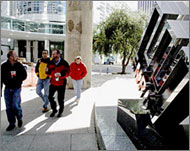Enron defence: No books were cooked
Former Enron Corporation chiefs are seeking much more than a “not guilty” in the US government’s premier criminal trial to emerge from the company’s stunning collapse.

They want to exonerate Enron, too.
Their lawyers steadfastly asserted on Tuesday that the men had committed no crimes, nor did they look the other way while minions cooked the books, because Enron was never rife with corruption and greed.
Former CEO Jeffrey Skilling’s lead attorney, Daniel Petrocelli, said: “This is not a case of hear-no-evil, see-no-evil.
“This is a case of there was no evil.”
Lawyer Michael Ramsey said his client, Enron Corporation founder Kenneth Lay, and Skilling were energy trading pioneers who deeply loved a company felled by an acute crisis of market confidence “almost Greek-like in its tragic proportions.”
But a federal prosecutor told the more familiar story: Lay and Skilling repeatedly lied to maintain Enron’s polished image of success when they knew the heady profits and growth were illusory.
“This is a simple case,” prosecutor John Hueston told jurors in the government’s opening statement. “It is not about accounting. It is about lies and choices.”
Fragile financing
Hueston said Lay and Skilling sold Wall Street, auditors and Enron employees on a tale of “simply magical ability” to record consistent growth, but fragile financing was behind it all and “inside the doors of Enron, something was terribly wrong.”
 |
|
Former CEO Jeffrey Skilling (2L) |
The dramatically different presentations started what could be a four-month trial of Lay and Skilling, who are accused of fraud and conspiracy and could face decades in prison if convicted.
Enron went bankrupt in December 2001, six weeks after announcing massive quarterly losses and a $1.2 billion writedown in shareholder equity. The company, once loved by Wall Street, suddenly faced suspicion and hostility that sent investors fleeing.
Thousands of employees were left jobless and investors lost billions.
Skilling faces 31 counts of fraud, conspiracy, insider trading and lying to auditors. Lay faces seven counts of fraud and conspiracy.
Hueston challenged the two chief executives’ public cheerleading for a company with a crippled balance sheet.
Skilling touted Enron’s broadband unit as a multibillion-dollar behemoth to Wall Street in 2000 and 2001 while the rest of the telecom industry struggled.
He told broadband employees in March 2001 that the telecom market was in “absolute meltdown,” but told analysts days later the division was “coming along just fine,” and “in fact, I’m pretty optimistic about it.”
‘Accounting scandals’
After Skilling resigned in August 2001, Lay received a memo from Sherron Watkins, former Enron vice-president, warning him that the company could “implode in a wave of accounting scandals.”
 |
|
Thousands of Enron employees |
Yet five days later, Lay told Business Week Online that Enron faced “no accounting issues” and “there is no other shoe to fall.”
Ramsey blamed Wall Street suspicion and negative publicity for siphoning market confidence in a trading company – which he called a “risky business” – that relied on trust and credit to stay alive.
Petrocelli even suggested 13 of the 16 ex-Enron executives who had pleaded guilty to federal crimes were innocent, but caved in to pressure from zealous federal prosecutors and fear of spending decades in prison.
One of those 13, Mark Koenig, former Enron investor relations head, was set to be the government’s first witness on Wednesday.
‘Opinion’
Another, Kenneth Rice, who ran Enron’s money-losing broadband unit and was a close ally of Skilling, will testify after Koenig, prosecutors said.
Petrocelli blamed the remaining three – Andrew Fastow, former Enron finance chief, Michael Kopper, former Fastow aide and Ben Glisan Jr., former treasurer – for stealing from Enron.
But he said the others who struck plea deals were “hooked” by prosecutors, and he challenged jurors to find the facts about Enron and ignore four years of “opinion” about its collapse.
Lay has repeatedly said publicly that he will testify. On Tuesday, Petrocelli told jurors Skilling would as well.